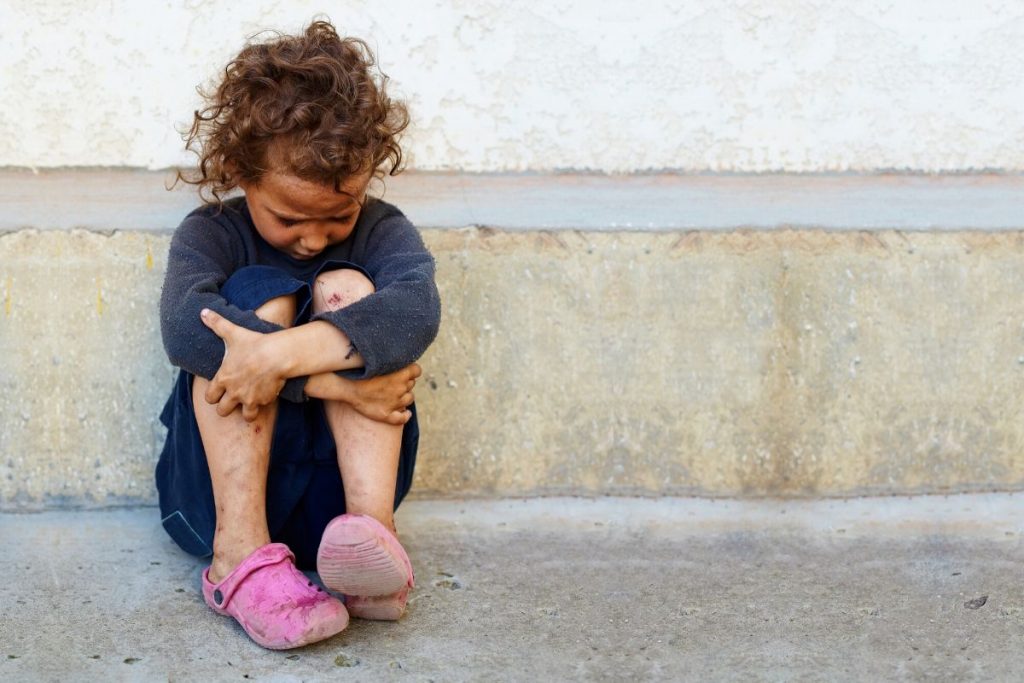How Homelessness Affects Children in America

Published August 7, 2022
When we hear the word “homeless people”, the first image that comes to mind is people sleeping on parks and pavements. But unknown to many, there is one group that is most affected by the country’s homelessness crisis: children.
In this post, we’ll explore the unfortunate plight of homeless children in America.
The State of Child Homelessness in America
According to a national survey, there are now over 2.5 million homeless children in America. This statistic means that 1 in 30 children in the country is experiencing homelessness each year. A federal report also revealed that the number of homeless students from kindergarten to 12th grade has grown by 70% over the past decade. This doesn’t include runaways and out-of-school youths.
Most of these children are from single-parent families which comprise a majority of the country’s homeless population.
New York, Florida, California, and Massachusetts topped the list of cities with the highest number of homeless families. Almost a quarter of these families were staying with family and friends before they ended up in homeless shelters and transitional housing.
For most of these families, homelessness is a temporary or one-time experience. Though an estimated 29% of them are experiencing chronic homelessness and they are also more likely to be unsheltered.
Homelessness advocates, however, claim that the actual figures are much higher. That’s because schools and even local governments are not trained enough to identify homeless children. In most cases, they only count those who are sleeping on the streets or in homeless shelters.
The thing is, homelessness can look different for everyone. Some homeless youths are staying with relatives and friends, hopping from one place to another. While others are lodging in motels and other transient accommodations. Though they are technically sheltered, they are always at risk of being turned out in the streets.
Since many of these children and families do not meet the government’s definition of homelessness, they’re not included in any statistics. As a result, they don’t get access to public and housing assistance services that they need to get back on their feet.
What Causes Child Homelessness?
There are several factors that contributed to the current lamentable state of child homelessness in the US. Some of them are:
Lack of Affordable Housing
Most cases of child homelessness are a result of family homelessness. Like most homeless individuals, one of the biggest driving factors for homelessness in families with children is the lack of affordable housing.
In large cities, rapid urbanization has caused a huge spike in housing prices. Families who were earning just enough to get by now find themselves unable to afford rent. Some of them have to spend half of their income on rent that they barely have enough for other needs. So when unexpected things happen like the loss of a job or sickness in the family, many of them end up on the streets or in homeless shelters.
Evictions
Families with children are more likely to face eviction compared to childless households. In some areas, lease agreements tend to be more prohibitive. Overcrowding, noise complaints from other tenants, and damages to the property can all be reasons for eviction. As you probably know, not many landlords would be willing to rent out to people who’d been evicted. So they’re usually forced to stay with relatives and friends or live in transient accommodations.
Domestic Violence
Another major contributor to child homelessness in the US is domestic violence. Many children who end up in homeless shelters ran away from home due to physical, emotional, or psychological abuse. Women who experience violence at home also tend to run away with their kids in tow. Most of them end up doubling with friends or relatives, in homeless shelters, or on the streets.

The Effect of Homelessness on Children
For the past several years, steps have been done to address this growing crisis of youth homelessness. But the recent explosion in housing and urban development in most cities seems to undermine these efforts. As real estate prices continue to rise, more and more children are losing their homes. This, in turn, affects their education and health and leaves a lasting trauma.
Here are the different ways homelessness affects children:
1. Education
Homelessness statistics from the National Center for Homeless Education revealed that about 4% of children enrolled in public schools are unsheltered. While about 12% are living in shelters, transitional housing, or are awaiting foster care.
With no permanent place to stay, most homeless children struggle to go to school. They lag behind on lessons, homework, and other school activities.
Federal law mandates school districts to provide transportation for homeless children. But oftentimes, this isn’t enough to keep a child in school.
When the family moves to a different shelter across the state, it means a new school for the children. Some homeless children even reported having changed schools at least twice a year.
As the new kid in school, homeless children are often subjected to bullying. Not only that but every time a child transfers school, they lose around four to six months of academic learning. Add to this the stress of adjusting to yet another unfamiliar environment. It’s no wonder why many of them choose to skip school.
With these difficulties, it’s no wonder that only very few homeless children and youth actually make it through high school. No diploma means lesser employment opportunities. Thus, they tend to become homeless even as adults.
2. Health
Because they often have to skip meals, many homeless children suffer from malnutrition. As a result, they are more prone to diseases.
Data gathered by private institutions suggest that asthma is one of the most common illnesses of homeless kids. Displacement often interrupts their asthma maintenance. Staying in homeless shelters also increases their exposure to various kinds of allergens that trigger attacks.
Lack of access to sufficient and nutritious meals can take a toll on anyone. But it can be especially devastating for children. Very young children housed in shelters are found to have a high rate of iron deficiency anemia.
Experiencing hunger and homelessness at an early age also increases their risk of developmental delays. This affects them even until adulthood which puts them at a great disadvantage among other children their age.
3. Psychology
Most people experiencing homelessness often have to deal with mental health issues. But homelessness experience can leave an even deeper trauma for children. And it’s a known fact that childhood traumas often manifest in an adult’s behavior.
Being a constant victim of bullying and having no safe place to call their own can mess up a child’s emotional response. Bullied children turned out to be either violent or closed off to the world. Either way, they have difficulty trusting others and building relationships. Not to mention that the constant moving about keeps them from getting to know other people long enough to form even a semblance of friendship.
Most homeless children have also been victims of domestic violence. Studies suggest that these children often display signs of various behavioral problems. This can include aggression, self-disturbance, anxiety, and depression.
4. Substance Abuse
Homelessness and substance abuse often go hand in hand. You may think that substance abuse only concerns homeless adults but it affects homeless children and adolescents too. In fact, a study shows that children of substance abusers are more likely to become addicted to substances too.
If a homeless parent is a substance abuser, they’ll inevitably expose their children to the habit – normalizing it in their eyes. This coupled with hunger, violence, and psychological issues often push homeless youths to become substance abusers themselves.
Help Us Help The Homeless
We at Our Father’s House Soup Kitchen have been helping homeless adults and children in South Florida since 1989. Our mission is to provide them with a safe haven where they can get meals free from condemnation and discrimination. Aside from hot lunches, our guests also get a take-out bag, clothes, and hygiene kits.
You can help us help the homeless too. We accept donations in cash or in kind. You can donate through our online facility or drop off food or clothing donations at our office in Pompano Beach. Any amount will be a huge help in getting them through this trying time.
You might also like: Small Ways We Can Help End Homelessness
Donate To The Poor & Homeless Of South Florida
Our Father’s House Soup Kitchen has fed the poor and homeless in South Florida over 900,000 hot meals since 1993. Our tax deductible non profit organization also accepts and distributes donations such as clothing, toiletries, shoes, bicycles, and more. You can donate to help the poor and homeless through our website.

Reviewed For Factual Accuracy
Our team meticulously fact-checks all website content before publishing. Discover more about our website’s editorial standard here and the dedication we uphold.

About The Author
Judy Ponio is a professional writer and devoted Christian. She has a passion for writing about topics related to morality and helping the poor and homeless. She is the lead author for the Our Father’s House Soup Kitchen blog.
Correct Digital, Inc is paid by private donors to provide website digital marketing services to this non-profit organization.





